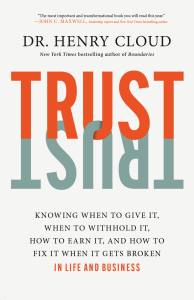5 Essentials of Trust from Dr. Henry Cloud, NYT best-selling author of Boundaries

Trust is the fuel for all of life. We are wired biologically, neurologically, emotionally, spiritually, and psychologically to trust. Trust is the currency that drives every relationship, beginning with the foundational bond between infants and their mothers, extending to the trust networks that undergird every human endeavor – art, science, commerce – and binding together every relationship we have ever had or ever will have. Nothing in our world works without trust. In Trust, Dr. Henry Cloud walks through in-depth the 5 essentials of trust. The more we can identify and understand these traits, the better we can perceive them in others and live them out ourselves. This knowledge will help us to know what to look for in other people as we decide whom to trust, leading us to more trusting relationships and giving us greater ability to avoid people and situations that will bring us harm. Below are the 5 essentials of trust and excerpts on their importance.
1. UNDERSTANDING
The process of trust begins by listening and by understanding other people—what they want and what they’re feeling—in short, knowing what matters to them. The task is to know them instead of to persuade them. People must feel known in order to trust. Trust begins not with convincing someone to trust you; it starts with someone feeling that you know them. When someone feels that you understand them, something magical happens. The brain begins to change, to move from its neutral or guarded state, or an “against you” state, to an open state. Their brain opens up to being open to you, and trust takes its first step.
2. MOTIVE
But, even when someone understands what you need, it is possible for them to be in it just for themselves and not for you. Thus, real trust is built not only through understanding but making sure the other party’s motive is right, meaning that they are for your good. The second essential of trust—motive—is the one that keeps our entire system wondering about people. “Why is he or she doing this? Who is it really for? What are they trying to get out of this? Do they want something good for me too?” These are important questions that everything about us continually wants to decode in order for us to be truly “careless.” When the motive is to benefit others and not just ourselves, everyone profits.
3. ABILITY
The third essential of trust is ability, or capacity. This means a person can deliver what you are trusting him or her to deliver. It’s being able to do what you need them to do. Understanding and motive must be supported by ability. Someone can be a wonderful and capable person in many ways but not be someone we want to trust in a specific way. People make big trust decisions because they already trust someone in many ways. The person is caring, honest, works hard, has good values, and is understanding and pure-hearted, smart, and creative. He or she probably has many other positive traits too. So, the “trust” button gets pushed, and they entrust something to such a good person. Usually, they really like the person, are already close friends, or have had great experiences with them, and these dynamics also make them trust the person. But this is a mistake because the person doesn’t have the ability needed to be trusted— not in the specific way or context in which they are about to be trusted.
4. CHARACTER
I am so intent on helping you to see that character is more than honesty and ethics that I fear not saying this strongly enough, so I will repeat it once more: without basic character traits of honesty, transparency, lack of duplicity (being the same person in public and private), responsibility, high morals, and others, we cannot have trust. So, as we go forward in seeing that a lack of trust can come from more than the absence of basic character qualities, let’s make sure that we know that a lack of honesty and morality cannot be tolerated or trusted, nor can it go unaddressed. It is essential; it’s bedrock. If you can’t believe a person, you have nothing to stand on. Again though, to go further, the important point here is that character is more than honesty and ethical behavior. It also includes the personal traits, the makeup of qualities needed in a person for whatever you are trusting them for in that relationship. In many contexts, if those traits are missing, the trust will fail. We need to be able to trust that someone’s makeup and character can deliver on what we have entrusted to them.
5. TRACK RECORD
The lesson is this: what someone has done before is usually the best indicator of what will happen next time. The best predictor of the future is the past. When we trust someone, we place ourselves in a vulnerable position, depending on someone to behave or perform in a certain way. And by definition, if they don’t, we will get hurt in some way—emotionally, relationally, financially, or even physically. If we don’t know if they are able to come through for our vulnerability, or especially if they have never done it before, we are rolling the dice. But if we know, based on a track record, that they have performed in a certain way before, the odds go up considerably.
New York Times bestselling author, psychologist, and leadership expert Henry Cloud equips us to understand and manage trust for successful relationships through five foundational aspects.
Trust is the fuel for all of life. We are wired biologically, neurologically, emotionally, spiritually, and psychologically to trust. Trust is the currency that drives every relationship, beginning with the foundational bond between infants and their mothers, extending to the trust networks that undergird every human endeavor – art, science, commerce – and binding together every relationship we have ever had or ever will have. Nothing in our world works without trust.
It is tempting to think that trust is simple, that we should be able to spot a lack of trustworthiness relatively easily. But we all have our stories about misplaced trust. We either missed clear or subtle warning signs or there just were not any warning signs to see. Everything looked good on the surface, and maybe it was. But we got burned anyway.
And sometimes we struggle to earn and keep the trust of those around us when trust bonds fail to form or are broken. When trust breaks down, so does our ability to move forward.
Dr. Cloud explores the five foundational aspects of trust that must be present for any relationship to function successfully and helps us to understand how to implement them. He also guides us through the difficult process of repairing trust when it has been violated and broken, even when restoring trust feels impossible.
Rich with wisdom drawn from decades of experience in clinical practice, business consulting and research, Trust is the ultimate resource for managing this most complex and fundamental of human bonds, allowing us to experience more fruitful and rewarding relationships in every area of our lives.

